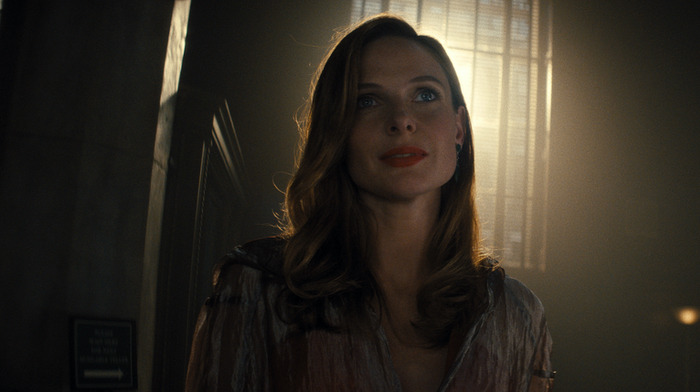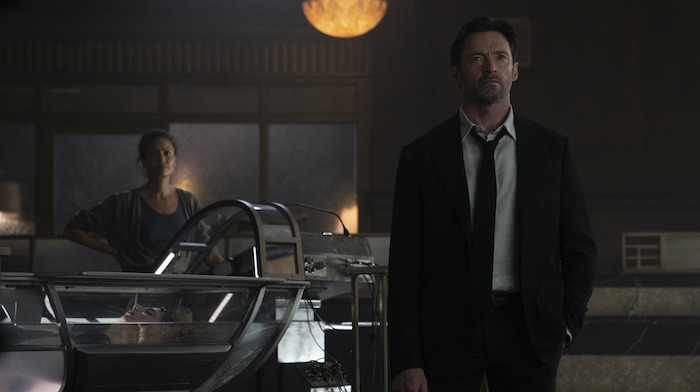'Reminiscence' Spoiler Review: Good Intentions Get Buried Amid The Murkiness Of Memory
Everything changes the moment she walks through that door.
That much is obvious from how Rebecca Ferguson is framed and lit in her introductory scene as the mysterious Mae, appearing like an angelic being who invades the darkness and grime of Reminiscence that Nick Bannister (Hugh Jackman) and Emily "Watts" Sanders (Thandiwe Newton) are all too familiar with. But we also know her presence knocks the tilt of Nick's world entirely off-axis because his clunky, oftentimes subtext-removing narration can't help but undercut the visuals to tell us exactly that. This early moment typifies just one of many ways that writer/director Lisa Joy's reliance on classic neo-noir tropes both gives and takes away, leaving us with the fun contradiction of a futuristic throwback tale that doesn't do nearly enough with that potential and somehow ends up less than the sum of its parts ... all despite the very well-meaning intentions at its heart.
Major spoilers for Reminiscence follow.
Object or Individual?
One of the first things you'll notice in Reminiscence is that Lisa Joy's camera loves Rebecca Ferguson. The film takes full advantage of every ounce of charisma, charm, and natural ability (both in terms of acting and singing!) that the actor used to stand toe-to-toe with Tom Cruise in the last two Mission: Impossible movies — and it's hard to blame the inclination here. It's not difficult to imagine that this downright worshipful reverence of Mae could've led to disaster in the hands of a male director, treating the sensuality and lust both Nick and Mae feel for each other as the end-all, be-all of their relationship with no further context. Joy avoids that pitfall, injecting a genuine sense of life and longing at a time when American movies have struggled to do so, though her overall approach works both to the film's advantage and disadvantage.
As part of the ongoing dialogue Joy (Burn Notice, Westworld) seems to be having with the genre at large, the initial depiction of Mae feels less like a stodgy retread of damsels in distress or femme fatales in countless movies past. In vintage noir fashion, her cypher-like motivations and distinct lack of characterization function as smokescreens to her eventual deception, of course. But it's also surprisingly effective as a pointed statement on how men tend to look at women as objects of desire, making us painfully aware of the fact that we're viewing only the most impossibly idealized version of Mae through the unseeing, puppy-dog eyes of Nick. To her credit, it's a very tricky balancing act that Joy walks with impressive balance and nuance in her feature film debut.
And yet, this ultimately renders Mae as an oddly inert passenger to the events of the story, floating from person to person and simply reacting to the increasingly dangerous situations she finds herself in. The screenwriting decision to go straight from Nick and Mae's initial meet-cute and ensuing night of passion to a time-jump to some undetermined point in the future well after Mae has already disappeared from Nick's life cuts Reminiscence off at its knees.
Not only are we shortchanged the crucial moments of watching the two get to know each other, but we are prevented from seeing the devastation that results in the immediate aftermath of her sudden vanishing. Viewers are left to play catch-up for the rest of the runtime, stuck with Nick embarking on his obsessive search (an acting mode that Jackman plays extraordinarily well, admittedly) in spite of the fact that we hardly have any working knowledge of him, the emotional hole he's desperately trying to fill, or Mae herself.
When a later reveal points toward Mae potentially being involved in a murder and a kidnapping, Nick feels betrayed and jaded enough to believe it without question ... but it's a much harder sell for audiences, who are given no indication of what Mae may or may not be capable of and thus can't get too invested in the discrepancy between her loving behavior with Nick and her possibly monstrous actions apart from him. Keeping Mae at arm's length from us is a clever and inspired direction to take the early parts of Reminiscence, but it comes at the cost of the entire driving force of the plot.
Memory and Nostalgia
If you've noticed I've hardly talked about the actual premise of Reminiscence, which involves the use of largely unexplained tech that gives people the ability to literally relive their own memories, that's by design. For a movie so focused on the idea of looking back, it's largely unconcerned with actually unearthing any fresh insights. Joy's script tends to treat its central plot device as a convenient means to an end, rather than as a loaded metaphor to explore our relationships with our own pasts.
There's a lot of lip service paid to the idea of whether we're haunted by our past or, as Nick's opening narration claims, we're the ghosts haunting the past. Similar to how we only really ever see Mae through the eyes of Nick and his constant projecting, this could've been an opportunity to dive deep into the subjective uncertainty and subconscious biases of our memories. After all, what more unreliable narrator is there than our own intensely personal and bone-deep feelings about the important faces, events, and periods of our lives that stick with us like birthmarks or scars?
Instead, the actual mechanics of this "reminiscence" device are disappointingly rote. While Nick and Watts hook the subject up to some fancy neural headgear and immerse them in liquid, a Blade Runner-esque verbal prompt is all it takes to dredge up specific memories that are then projected for all to see. Setting aside the bizarre optics of Nick looking away during moments of undressing and lovemaking but standing at rapt attention as he invades their privacy otherwise, the actual memories are presented as if there were film cameras set up in every situation and we're simply watching a brief historical snippet of what actually, undoubtedly, 100% happened in the past. It's Minority Report, essentially, but without any built-in margin of error that allows for the flaws and intricacies of the human mind.
Where is all the murkiness, the fogginess of memory that could've turned a simple sequence of looking for Mae's "misplaced" keys into a deep-dive into her psychology and state of mind? How much more drama could have been mined from the characters if, as is the case with another clear influence like Inception, messing around with the mind necessitated getting to know the subjects and breaking down their motivations, insecurities, wants, and needs on practically a screenplay-level of analysis? Not only would Nick, Mae, and even Watts feel more like human beings, but then the subsequent uncovering of Mae's mysterious disappearance and her (seemingly) sinister acts would feel more immediate and involving.
As it is, we're left with a vaguely futuristic sci-fi world in the throes of suffering from climate change (with oddly perfectly-working trains and infrastructure, despite being inundated by seawater?) and a population forced into a nocturnal lifestyle just to escape from the heat of the sun, yet almost none of it registers on any deeper level than mere world-building trivia. Our characters wander through this dystopian hellscape of haves and have-nots, but the all-powerful family at the heart of the conspiracy are briefly introduced 10 minutes in and then hardly appear again until the end. The ambitiously overreaching ending relies on the assumed emotional punch of Mae sacrificing herself for a child we barely care about, the latent feelings that Watts apparently has for Nick, and the Greek tragedy of Nick losing his love but spending the rest of his life reliving her brief presence in his life over and over again.
Reminiscence has its heart in the right place and attempts to defy the cynicism of the genre with a brash love story at the center of a sci-fi noir mashup, but far too many details get lost in the shuffle to really make it all land properly.
For most people, memories aren't a painstaking recreation of past events. They're messy, jumbled, sensory perceptions that evoke a feeling and a mood. I can't bring myself to dislike Reminiscence, which makes me think it's entirely possible that looking back at this movie with the benefit of time and distance will make me feel much warmer about it. Perhaps there's something fitting about that.


